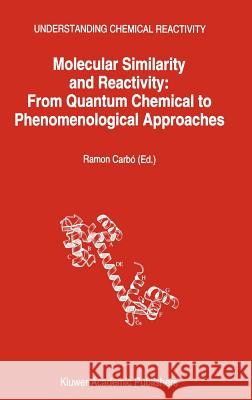Molecular Similarity and Reactivity: From Quantum Chemical to Phenomenological Approaches » książka
Molecular Similarity and Reactivity: From Quantum Chemical to Phenomenological Approaches
ISBN-13: 9780792333098 / Angielski / Twarda / 1995 / 324 str.
In the study of various phenomena in nature, the concept of similarity plays a fundamental role. Chemistry is no exception; the similarity of molecules, both in their physical properties and in their chemical reactions, provides a basis for their classification, characterization, and scientific description. Ultimately, the recognition and analysis of molecular similarities serve as the basis of an understanding of molecular structures and properties, and rep- resent the first steps in the development of theoretical models explaining chemical behavior. In this role, molecular similarity is the foundation of predictive models in chemistry. Molecular similarity and molecular reactivity are strongly related. Studying the reactivities of molecules is an important tool for detecting molecular similarities and differences; alternatively, similar molecular properties often imply similar reactivities. This latter aspect is of special value, allowing chemists to make predictions concerning the outcomes of chemical reactions based on molecular similarities. In this book, the central theme, molecular similarity, is discussed from a variety of viewpoints covering the range from rigorous quantum chemical approaches to phenomenological observations expressed within appropriate physical and mathematical frameworks. The authors of the various chapters represent some of the most current fields of research on molecular similarity. It is the hope of the editor that by bringing these subjects together under the cover of this book will provide the readers with a broad perspective and a handy reference of the contemporary approaches to similarity analysis of molecules and reactions.











